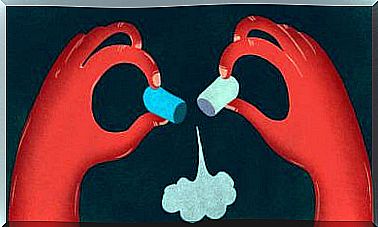When Anger Makes Us Sick

Anger is one of the most powerful passions that a human being can experience. It takes many forms: resentment, hatred, intolerance, irritability, etc. In all these facets the common thing is discomfort and the desire to confront the other.
It is a feeling that we all experience and that, in principle, is positive. Anger is a response to what is experienced as a threat. It reaffirms the identity to the extent that it gives rise to the expression of personal needs and desires. It also protects: sometimes angry vigor is needed to face the aggression of others.
We all know that anger also has another very negative side: both for us and for the people around us. It is not so much that it is experienced, but with what intensity, for what reasons and with what consequences. This passion becomes so invasive that it sometimes becomes a permanent state. It also ends up blocking vital energy and condemning us to stagnation.
One of the most negative aspects of anger is that it supposes a strong discharge of reactions in the body. If we experience it too frequently, it ends up making us sick physically and emotionally.

Anger and its manifestations
Anger has impressive effects on the body. When experienced, it leads to three types of responses: bodily, cognitive, and behavioral. It is activated when the person feels threatened and prepares to attack. This causes various physiological reactions:
- The heart rate increases.
- Breathing accelerates.
- Blood flow skyrockets.
- The muscles tense.
- The levels of adrenaline, norepinephrine and cortisol increase.
What follows is a decrease in the ability to process internal and external information (cognitive response). Ultimately this translates into behaviors, one of which may be the activation of verbal or physical aggressiveness. There it translates into violence.
It should be clarified that three kinds of anger have been typified : 1) precipitated and sudden anger, which is activated when someone feels tormented or cornered; 2) Stable and purposeful anger, which is equivalent to resentment: it manifests itself in episodes and is maintained over time and 3) Recurrent anger, when it is expressed frequently and becomes a “normal” part of the personality.
Sick anger
There are several studies that show the harmful effect of anger on our physical health. Research from the Center for Disease Control and Prevention in Atlanta (USA) indicates that those who experience recurrent anger are at higher risk of suffering a stroke or stroke. The experts studied 14,000 individuals and concluded that people who spent the most time angry were more vulnerable to having a stroke.

It was also established that the most irate have a more fragile immune system and therefore are prone to infectious diseases. Likewise, evidence was found that the discharge of hormones, such as adrenaline, favors the formation of blood clots and weakens the walls of the vessels.
At the John Hopkins School of Medicine, a study was also carried out with 1,100 students, for 16 years, to later compare the results with their medical records in the following decades. It was finally concluded that those who got angry easily had almost three times the risk of having a heart attack . In another study it was shown that anger increases the level of fat in the body and causes sensitivity to physical pain to increase markedly.
A toxic passion
Of course, experiencing anger virtually produces negative hormone intoxication in the body. Perhaps its physical effects are not immediately felt, but if that state is maintained over time, its traces on the body will also be evident.
There is nothing wrong with feeling anger: it is an instinctive emotion whose main positive or adaptive function is to preserve us. What is really negative appears when we allow the enormous amount of energy that this emotion endows us with to express itself in an uncontrolled way; without doing any kind of management of it.
Another negative way of managing it, in addition to not doing it, occurs when we opt for full containment. In these cases, a “pressure cooker” effect is generated, which sooner or later explodes.

When angry, it is best to take a minute of voluntary isolation. Counting to 10 does work, in some cases up to 15 or 20. Stand back for a moment and take a deep breath as well. When calm comes, what follows is to speak clearly and without getting excited about what causes us displeasure. Finally, in these types of situations it is also important to try to identify factors outside the situation that trigger anger; if there are, of course.









